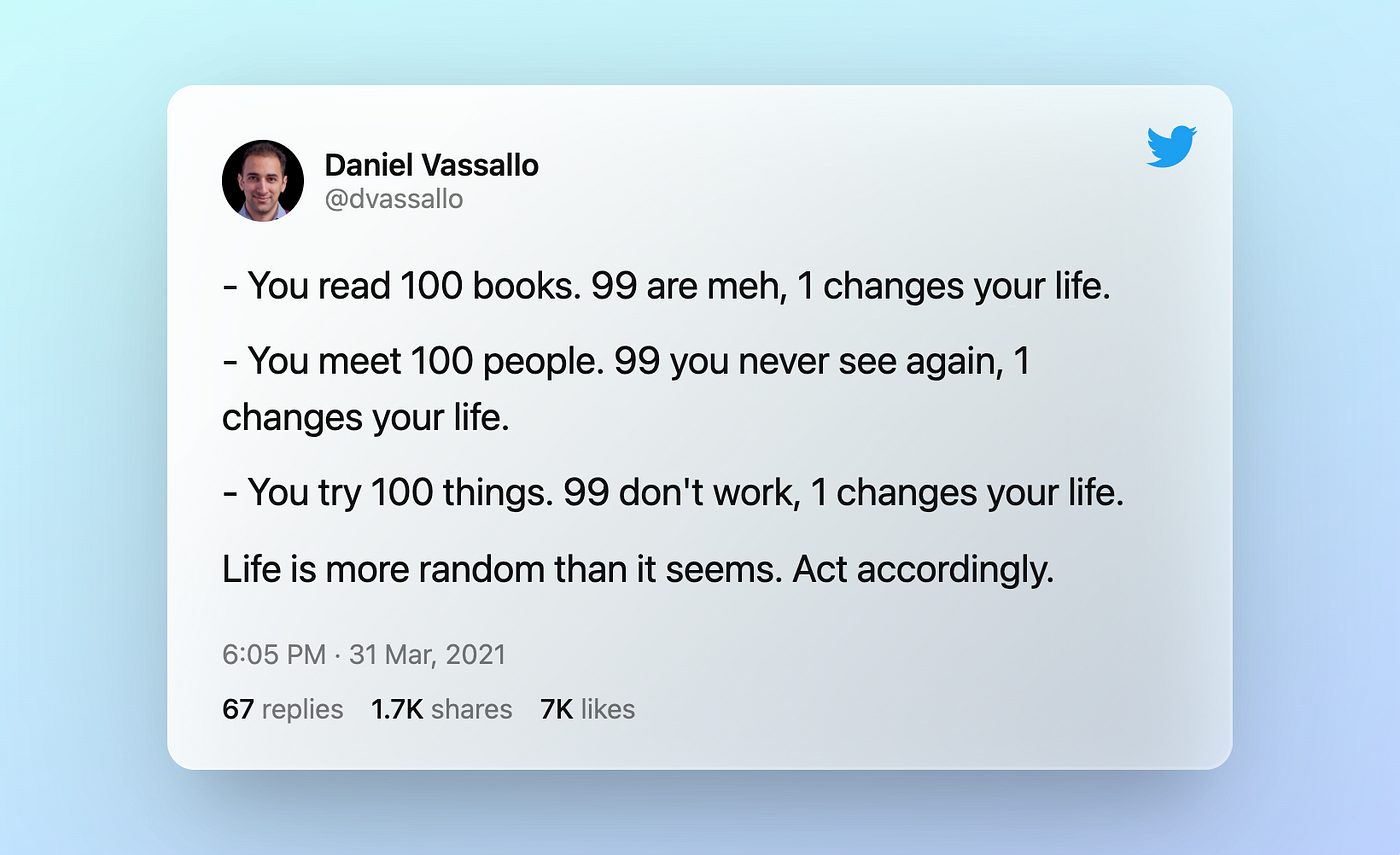Broaden Your Luck Surface Area

You can’t directly control luck, but you can move from strategies with bad odds to strategies with good odds — Scott Adams.
Since reading the book How to Fail at Almost Everything and Still Win Big by Scott Adams (highly recommend!), I’ve been thinking a lot about the role of Luck in our lives.
Scott starts the book by asking: was his eventual success primarily a result of talent, luck, hard work, or an accidental just-right balance of each?
It’s impossible to know, and he goes on to say, “All I know for sure is that I pursued a conscious strategy of managing my opportunities in a way that would make it easier for luck to find me.”
So, what does it mean to pursue a conscious strategy? What are strategies with good odds?
Instead of rushing through life and waiting for things to happen to us, what can we do to broaden our Luck Surface Area?
We Have More Control than We Want To Believe
Before we go further, it’s helpful to define what we mean by Luck, as it often gets used interchangeably with Fortune and Chance.
Here is how Tina Seelig, professor of entrepreneurship at Stanford, describes it in her wonderful book What I Wish I Knew When I Was 20:
- Fortune is something that happens to you. It is good fortune to be born into a kind family and bad fortune to be struck by lightning.
- Chance requires an action on your part. You need to take a chance, such as buying a lottery ticket, or asking someone out on a date, to benefit from a chance event.
- Luck is success or failure apparently caused by chance. It looks like it’s chance because we rarely see everything that has gone before success or failure. Luck is made by finding and creating opportunities. It is a direct consequence of your behaviour.
It’s important to differentiate these terms because there is a clear implication here. It’s easy to assume successful people are just luckier than the rest of us, but that’s a lazy way of thinking. We have more control than we allow ourselves to believe.
There’s no denying the role of fortune, and life is not a level playing field. There’ll always be someone smarter, more interesting and more talented than you, with more free time and more money. No doubt.
But what will you ever get out of focusing on that?
A Resource We All Have Access to
The first thing that comes to my mind when thinking about creating new opportunities is working harder. Trying more new things, experimenting and failing.
While that’s important, there’s another way to think about it, as offered by entrepreneur Ben Casnocha:
“Every opportunity is attached to a person. Opportunities do not float like clouds in the sky. They’re attached to people. If you’re looking for an opportunity — including one that has a financial payoff — you’re really looking for a person.”
This is interesting because this is something we can all do. We all have access to other people, no matter who we are.
That brings us to our Luck Surface Area, a concept coined by tech entrepreneur Jason Roberts.
The amount of serendipity that will occur in your life, your Luck Surface Area, is directly proportional to the degree to which you do something you’re passionate about combined with the total number of people to whom this is effectively communicated. It’s a simple concept, but an extremely powerful one because what it implies is that you can directly control the amount of luck you receive. In other words, you make your own luck.
To throw this into a simple formula:
Luck Surface Area = The Action You Take Around [X] x The Number of People You Communicate [X] To
You have to put in the work, but at the end of the day, all the hard work in the world won’t get you far if you don’t engage with people.
So, start there. Start with people in your immediate surroundings — friends, family, strangers.
Tina, our Stanford professor, tells this story in her TedTalk on the little risks you can take to increase your luck. The story itself is not necessarily groundbreaking but illustrates all the points I am going to make.
She talks about the time she was on an early morning flight. Usually, she’d put in her headphones and get some work done. However, this time, she decided to take a little (social) risk and introduce herself to the man sitting next to her. She learned he was a publisher, and they had a lengthy conversation about the publishing industry. Then, she decided to take another small (emotional) risk, and she shared with him a book proposal she had put together. He read it, thanked her for sharing, but said it wasn’t a good fit for them.
They exchanged contact details at the end of the flight, and each went their way.
A couple of months later, she invited him to Stanford for a class she was teaching on the future of publishing, which he gladly accepted. Fast forward a few months, she wrote to him again, sending video clips of a project her students had done. He was intrigued by one of the projects and wanted to meet the students, as he thought there could be a book in it.
He came back to Stanford and brought a colleague with him. During lunch with everyone, the colleague asked Tina if she had ever considered writing a book. “Funny you should ask…”. She pulled out the same proposal she had shared a year earlier. Within two weeks, she had signed a contract. Within two years, the book had sold a million copies around the world.
Tina says she’d often get the remark of “You’re so lucky”. Sure, but her luck resulted from a series of small risks she took, starting with saying hello.
Let’s break it down.
1. Talk to Strangers
I read an entire book about the power of talking to strangers, and it’s fascinating that, despite the research, we find this so difficult.
For example: why don’t people talk to one another on the subway? I live in London and take the tube to work. There’s no internet connection, so it’s one of the rare times I look around and observe people. It’s true — no one talks. Nicholas Epley, a University of Chicago behavioural scientist, argues it’s not that everyone prefers silence, but that we all assume no one else wants to talk, and we believe it will go poorly if we try.
I can relate to that. I’ve often held back from saying or asking something to a stranger, even though I was curious about which book they were reading or where they got that backpack from. When I'm feeling particularly confident, I ask. Most of the times, I don't.
Yet, every time someone has started a random conversation with me, I love it (okay, almost every time). I’d walk away thinking to myself, “I need to do that more often”. And then I rarely do.
So my takeaway — talk to strangers, and go first. Assume people are just as shy as you but are open to conversation. And if they’re not? Nothing lost.

2. Tell People What You’re Working on
If any of my friends are reading this, I’m sure they’ll think this is rich coming from me.
I rarely talk about what I’m doing because I don’t want to come across as self-indulgent and self-promoting. I am so worried about talking too much about myself that I go into the other extreme.
I’m working on it, though. I just posted an Instagram post announcing my newsletter and have been pushing myself to talk about it to friends and family.
I need to remind myself that people are genuinely interested and opportunities come through telling people what you’re doing (or want to be doing).
If no one knows what you’re working on, no one can help you. No one can give you ideas. They can’t connect you to other people who might be interested in what you’re doing.
Also — dare to ask for things. Unlucky people wait to be discovered and given what they want. Lucky people discover themselves and ask for what they need. Don’t ask, don’t get.
3. Show Appreciation
If someone gives you your time and energy, let them know you appreciate it. Do your best to let people remember every interaction with you as positive as possible.
A good tip from Tina Seelig in her book: every evening, she reviews her calendar and sends a thank you note to everyone she has met that day. It only takes a few minutes, she feels grateful and appreciative, and it has strengthened her relationships and ultimately increased her luck. I want to give this a try, so I’ve put a recurring invite for 15 minutes in my calendar every evening.
4. Follow Up
This one I find the most difficult, but it is probably the most important.
It’s not enough to reach out to someone, and then when it doesn’t immediately go anywhere, think, “Oh well, I’ve tried, but as expected, no luck.”
Tina could’ve been offended when the editor rejected her book proposal on the flight. Instead, she reached out to him afterwards, inviting him to her class and sending him things he might be interested in without any agenda.
As Kevin Kelly says in his 68 Bits of Unsolicited Advice:
Don’t take it personally when someone turns you down. Assume they are like you: busy, occupied, distracted. Try again later. It’s amazing how often a second try works.
Most lucky people are incredibly persistent. They try and try and try some more. Many of those efforts don’t pan out. A few do.
To recap
Luck Surface Area = The Action You Take Around [X] x The Number of People You Communicate [X] To
Broaden your Luck Surface Area by relying on a resource we all have access to in some shape or form: people.
Do the work, but mostly:
- Talk to strangers
- Tell people what you’re doing
- Show appreciation
- Follow up
Member discussion